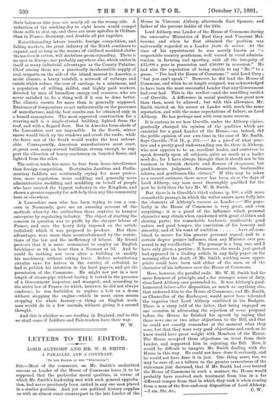LETTERS TO THE EDITOR.
LORD ALTHORP AND MR. W. H. SMITH : A PARALLEL AND A CONTRAST. [to THE EDITOR OF THE "SPECTATOR."]
SIR,—Most of the comments on Mr. Smith's undoubted success as Leader of the House of Commons leave it to be supposed that the particular moral qualities, in virtue of which Mr. Smith's leadership met with such general approba- tion, had never previously been united in any one man placed in a similar position. And yet our political history supplies us with an almost exact counterpart to the late Leader of the House in Viscount Althorp, afterwards Earl Spencer, and father of the present holder of the title.
Lord Althorp was Leader of the House of Commons during the successive Ministries of Earl Grey and Viscount Mel- bourne, and when he first obtained the position was universally regarded as a Leader faute de mieux. At the time of his appointment he was merely known as "a respectable country gentleman, well versed in rural adminis- tration, in farming and sporting, with all the integrity of £15,000 a year in possession and £50,000 in reversion." He had also the reputation of being unable to say " Bo !" to a goose. " You lead the House of Commons !" said Lord Grey ; " but you can't speak !" However, he did lead the House of Commons, and when he at length resigned, was acknowledged to have been the most successful Leader that any Government had ever had. This is the verdict—and the unwilling verdict —of Greville. A difference in social position, less great now than then, must be allowed ; but with this allowance, Mr. Smith started on his career as Leader with much the same reputation, and with the same expectations of failure, as Lord Althorp. He has perhaps met with even more success.
It is curious to see how Greville, under the Althorp rjgime,_ gradually changed his opinion of the qualities which are essential for a good Leader of the House,—as, indeed, did the public opinion of our own time in the case of Mr. Smith. Says Greville (Vol. II., p. 205) :—" As a proof of what prac- tice and a pretty good understanding can do, there is Althorp, who now appears to be an excellent leader, and contrives to speak decently upon all subjects, quite as much as a leader need do ; for I have always thought that it should not be his business to furnish rhetoric and flowers of eloquence, but good-humour, judgment, firmness, discretion, businesslike talents, and gentleman-like virtues." If this may be taken as a correct estimate, there never has been, sir ce the days of Lord Althorp, any man more thoroughly qualified for the post he held than the late Mr. W. H. Smith.
But there is in Greville's third volume (p. 108) a still more remarkable passage, in which the writer enters more fully into the elements of Althorp's success as Leader :—" His popu- larity in the House of Commons is very great, and even surprising ; it is a proof of the influence which persona/ character may obtain when unadorned with great abilities and shining parts; his remarkable bonhomie, unalterable good nature and good temper, the conviction of his honesty and
sincerity, and of his want of ambition have all com- bined to secure for him greater personal regard, and to a certain degree greater influence, than any Minister ever pos- sessed in my recollection." The passage is a long one, and I have only given a portion ; if, however, the words just quoted had appeared in a leading article in any daily paper on the- morning after the death of Mr. Smith, nothing more appro- priate could have been said either of the man, or of the character of his influence over the House of Commons.
Here, however, the parallel ends. Mr. W. H. Smith had far more firmness of principle, and a far stronger sense of duty,. than Lord Althorp ever pretended to. It was Althorp's good- humoured laisser-aller disposition, as much as anything else, that endeared him to the House of Commons; and Mr. Smith, as Chancellor of the Exchequer, would never have tolerated the vagaries that Lord Althorp exhibited in his Budgets. There is a story told of the latter, that being engaged on one occasion in advocating the rejection of some proposal before the House, he finished his speech by saying that there were one or two other objections to the Bill, and that he could not exactly remember at the moment what they- were, but that they were very good objections and such as he knew would have great weight with Members of the House. The House accepted these objections on trust from their Leader, and supported him in rejecting the Bill. Now, it would be difficult to imagine Mr. Smith dealing with the House in this way. He could not have done it seriously, and he would not have done it in jest. One thing more, too, we may be sure of, as a tribute to the greater earnestness of the statesman just deceased, that if Mr. Smith had ever treated the House of Commons in such a manner, the House would probably have received such treatment from him in a far different temper from that in which they took it when coming from a man of the free-and-easy disposition of Lord Althorp.


































 Previous page
Previous page